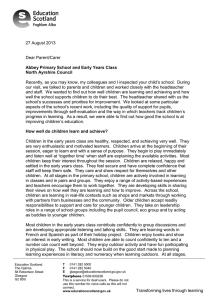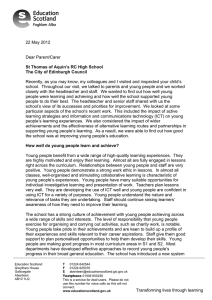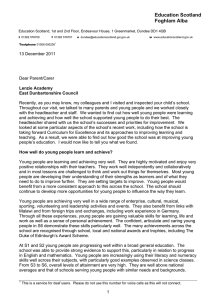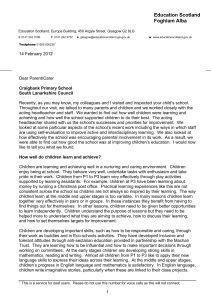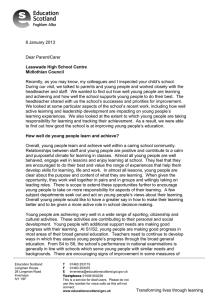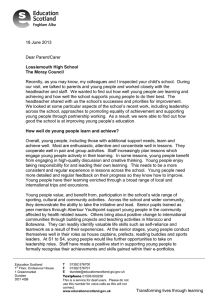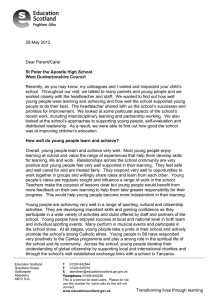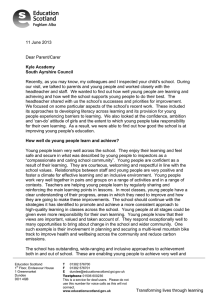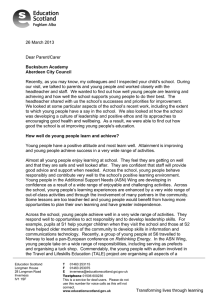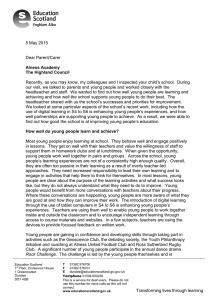Education Scotland Foghlam Alba
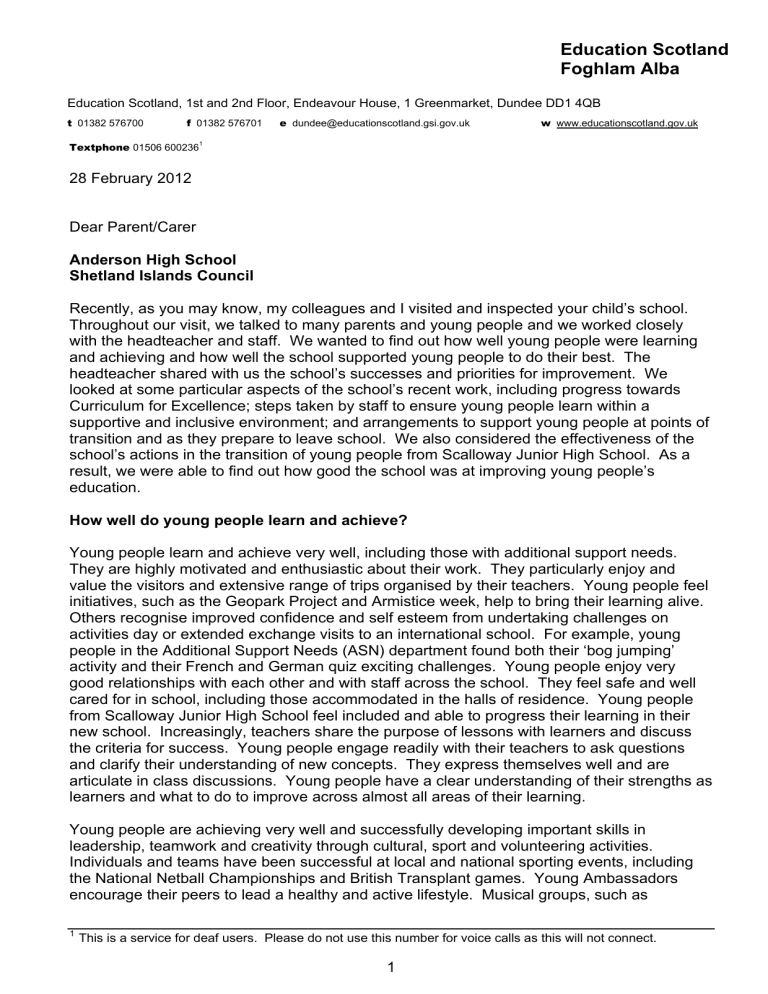
Education Scotland
Foghlam Alba
Education Scotland, 1st and 2nd Floor, Endeavour House, 1 Greenmarket, Dundee DD1 4QB t
01382 576700 f
01382 576701 e
dundee@educationscotland.gsi.gov.uk
Textphone
01506 600236
1
28 February 2012
Dear Parent/Carer
Anderson High School
Shetland Islands Council w
www.educationscotland.gov.uk
Recently, as you may know, my colleagues and I visited and inspected your child’s school.
Throughout our visit, we talked to many parents and young people and we worked closely with the headteacher and staff. We wanted to find out how well young people were learning and achieving and how well the school supported young people to do their best. The headteacher shared with us the school’s successes and priorities for improvement. We looked at some particular aspects of the school’s recent work, including progress towards
Curriculum for Excellence; steps taken by staff to ensure young people learn within a supportive and inclusive environment; and arrangements to support young people at points of transition and as they prepare to leave school. We also considered the effectiveness of the school’s actions in the transition of young people from Scalloway Junior High School. As a result, we were able to find out how good the school was at improving young people’s education.
How well do young people learn and achieve?
Young people learn and achieve very well, including those with additional support needs.
They are highly motivated and enthusiastic about their work. They particularly enjoy and value the visitors and extensive range of trips organised by their teachers. Young people feel initiatives, such as the Geopark Project and Armistice week, help to bring their learning alive.
Others recognise improved confidence and self esteem from undertaking challenges on activities day or extended exchange visits to an international school. For example, young people in the Additional Support Needs (ASN) department found both their ‘bog jumping’ activity and their French and German quiz exciting challenges. Young people enjoy very good relationships with each other and with staff across the school. They feel safe and well cared for in school, including those accommodated in the halls of residence. Young people from Scalloway Junior High School feel included and able to progress their learning in their new school. Increasingly, teachers share the purpose of lessons with learners and discuss the criteria for success. Young people engage readily with their teachers to ask questions and clarify their understanding of new concepts. They express themselves well and are articulate in class discussions. Young people have a clear understanding of their strengths as learners and what to do to improve across almost all areas of their learning.
Young people are achieving very well and successfully developing important skills in leadership, teamwork and creativity through cultural, sport and volunteering activities.
Individuals and teams have been successful at local and national sporting events, including the National Netball Championships and British Transplant games. Young Ambassadors encourage their peers to lead a healthy and active lifestyle. Musical groups, such as
1
This is a service for deaf users. Please do not use this number for voice calls as this will not connect.
1
Tunester, share the music and culture of the Shetland Isles at national conferences and exchange visits to Ireland. Young people in the ASN department enjoyed forming the Rising
Stars musical group and performing at a local music festival. Senior pupils demonstrate well-developed personal and social skills through acting as buddies and organising
‘Beanfeast’ events. They show they can take the initiative and lead, for example, through inspiring local primary children with their science workshops. International study visits have a positive influence on young people’s understanding of other cultures and lifestyles. Through all these experiences, young people gain a sense of personal achievement and increased self-confidence. The school recognises the need to support young people to recognise and record their achievements more formally.
Young people, including those in the ASN department, are making good to very good progress across the curriculum at S1/S2. At S4 to S6, young people’s results in national examinations have been consistently above national averages over a number of years.
Results are in line with or above those in schools which serve young people with similar needs and backgrounds. Young people at risk of missing out and those requiring additional support are making very good progress. Many achieve success and certification in a range of awards including Award Scheme Development and Accreditation Network (ASDAN) awards.
Almost all young people leave school to enter employment, training, further or higher education.
How well does the school support young people to develop and learn?
Young people, including those in the ASN department are very well supported by the school.
Most teachers pitch tasks and activities well to meet individual needs. Many build effectively on young people’s prior learning at the associated primary and junior high schools. Teachers make effective use of information and communication technologies to enhance learning. The highly skilled pupil support team and support for learning staff identify young people’s learning, social and behavioural needs very well. They provide very useful information to class teachers to help them support young people’s learning. ASN staff, including support assistants, work well with young people throughout the school. Very effective additional support is provided to young people and their families through effective partnerships with staff from partner agencies. As a result of these successful approaches, those who require support are making very good progress and achieve well.
The school provides a broad and enriched curriculum from S1 to S6 which meets the different and varied needs of learners well. Across almost all subject areas, a range of partners and visitors provide meaningful and relevant learning experiences for young people. At S1/S2, staff have refreshed and refined the curriculum to develop programmes which support young people to learn through more engaging and relevant contexts. Young people are beginning to make connections across their learning through well-planned themed days and projects. For example, young people enjoyed the ‘Make it, Bake it, Burn it’ collaboration between physical education and home economics. From S3 onwards, young people can choose from a wide range of subject courses, including those delivered in partnership with local colleges and community partners. Commendably, almost all continue to study a modern language to the end of S4. The school promotes equality and diversity through their international education work very well.
How well does the school improve the quality of its work?
The headteacher and depute headteachers have established a culture of self-evaluation across the school. As a result, staff are committed to using self-evaluation to improve the quality of young people’s learning experiences and achievements. Approaches include lesson observations, pupil surveys and the scrutiny and analysis of young people’s performance in national examinations. School and department improvement plans are
2
reviewed regularly throughout the year and revised as appropriate to ensure an impact on learners. Pupil support staff effectively monitor and track young people’s progress from S1 to
S6. They quickly identify and target those at risk of underachieving. Teachers gather the views of young people and use this feedback to improve their teaching approaches and course programmes. Principal Teachers work closely with subject teachers to identify and support their professional development needs. Teachers can identify aspects of their own practice which have improved as a result of sharing practice across their department and at whole-school level. A number of staff are involved in national working groups related to taking forward Curriculum for Excellence. They use this to good effect to inform developments at department and whole-school level. The school is aware of the need to involve pupils, parents and partners more fully in self-evaluation activities.
This inspection of your school found the following key strengths.
•
Well-behaved, responsible young people who are keen to learn and actively support their school and community.
•
A safe, caring, supportive and inclusive environment for all young people.
•
High-quality support from specialist staff for young people with particular learning needs.
•
Staff’s enthusiasm and dedication to enhancing experiences for young people.
•
The strong lead and direction from the headteacher, ably supported by the depute headteachers.
We discussed with staff and the education authority how they might continue to improve the school. This is what we agreed with them.
•
Continue to provide high-quality and improving education for all young people in line with the principles of Curriculum for Excellence.
•
Continue to build on the existing practice in self-evaluation involving pupils, parents and partners more fully in the process.
What happens at the end of the inspection?
We are satisfied with the overall quality of provision. We are confident that the school’s self-evaluation processes are leading to improvements. As a result, we will make no further evaluative visits in connection with this inspection. During the inspection, we identified aspects of innovative practice which we would like to explore further in order to share the practice with others. As a result we will work with the school and local authority in order to record and share more widely the innovative practice. We will ask the school, in discussion with the local authority, to let parents know the outcome of the innovative practice visits.
Fiona Robertson
HM Inspector
Additional inspection evidence, such as details of the quality indicator evaluations, for your school can be found on the Education Scotland website at http://www.hmie.gov.uk/ViewEstablishment.aspx?id=6366&type=3.
Please contact us if you want to know how to get the report in a different format, for example, in a translation. You can contact us at enquiries@educationscotland.gsi.gov.uk or write to us at BMCT, Education Scotland, Denholm House, Almondvale Business Park, Almondvale
Way, Livingston EH54 6GA.
If you want to give us feedback or make a complaint about our work, please contact 01506
600200, or write to us at the above address or e-mail: feedback@educationscotland.gsi.gov.uk.
3
